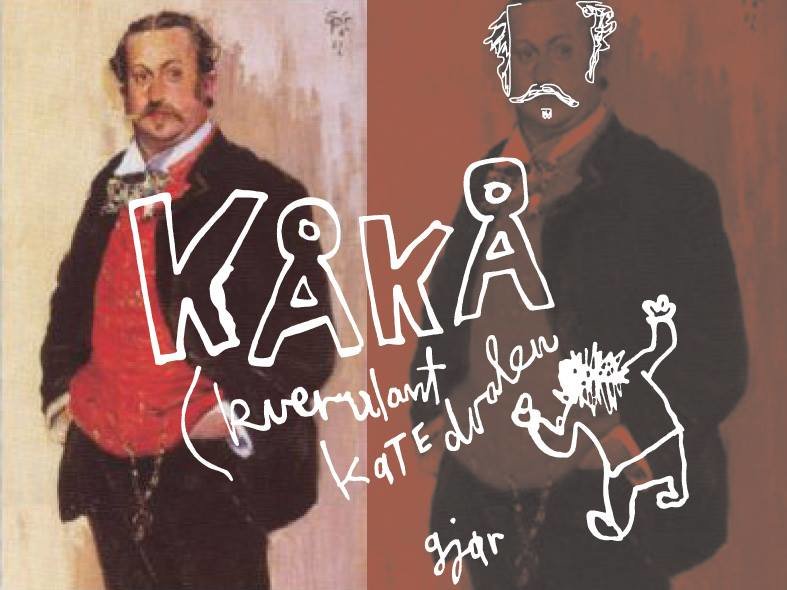Theme days: "The vital point of contention"
March 30 2016
The ‘kåkå quarrelsome cathedral’ once again invites the public to theme days in Stavanger in collaboration with Fritt Ord. This time the point of departure will be the concept of a “fellowship of disagreement”. At kåkå, we say that “the good quarrelsome person strengthens the fellowship of disagreement.” In a reply regarding the importance of the fellowship of disagreement in the newspaper Aftenbladet, the Chair of the Board and artistic leader concluded with the following twist on Norway’s Constituent Declaration of 1814: “In disagreement and faith until the Dovre mountains fall”. It is only with significant, good enough and not least visible disagreement as a foundation that makes it possible for politicians to frame sufficiently robust consensus resolutions in the city council and Storting that will afford us a stable and democratic Norway in future.
Lars Laird Iversen is the originator of the Norwegian concept that translates into a “fellowship of disagreement”. He will be appearing with a number of prominent speakers and participants to discuss the need for discord and the continuous attempts to restrict freedom of expression, also in Norway’s public sector, undermining the Norwegian fellowship of disagreement. The fellowship of disagreement in Europe, in business and industry, in literature and between Norwegian think tanks will be discussed.
Wednesday, 30 March – What now, Europe? When populism and nationalism flourish!
About Europe as a fellowship of disagreement in the light of new currently originating from new crises, and the need for democracy projects that engender broad, popular political commitment. Claudia Chwalisz is the keynote speaker. She has written about populism and new democracy projects in the book “The Populist Signal: Why Politics and Democracy Need to Change”, from 2015, and she is a senior policy researcher at the think tank Policy Network in London, in addition to being affiliated with the University of Sheffield.
Commentator: Frank Aarebrot (professor of Comparative Politics and Democracy Building) and Lars Laird Iversen (author of “The Fellowship of Disagreement”).
Moderator: Sten Inge Jørgensen (writer, expert on Europe and journalist in the newspaper Morgenbladet).
Thursday, 31 March – Modern muzzle! Dare we and can we disagree in the workplace? Meet Norwegian whistle-blowers.
Are we servile in the workplace? Is the room for different opinions? What about employers’ restriction of freedom of expression, not least in the public sector? Based on Marie Amelie and Dag Yngve Dahle’s “Modern Muzzles”, we will take a closer look at two whistleblowing cases in the public sector in Norway this evening. One case will be presented by Målfrid Frahm Jensen, who was recently awarded the Taboo Prize from the Norwegian Council for Mental Health for reporting psychiatric coercion at CSIS. She ultimately had to resign her position as an experience consultant due to the difficult working conditions.
Moderator: Knut Olav Åmås
Friday, 1 April – Do we have a Kielland for the Oil Age? If so, who or which one? (Accompanied by oil rap and oil troubadour)
Is it possible to understand the Oil Age by reading contemporary literature? What role does the author play in the fellowship of disagreement in the age of introspective literature? Is there contemporary literature gives us the requisite acknowledgement and identity as an oil capital in an oil-producing nation? Or have the authors failed the history of oil?
Oil rap: Atlars. Oil troubadour: Svein Tang Wa.
Espen Stueland (author and critic whose latest book is “The 700- Year Flood”), Marit Eikemo (author and publisher whose latest book is “All Inclusive”), Gunnar Roalkvam (historian, urban poet, copywriter), Nils Rune Langeland (historian at University of Stavanger and recent contributor to the book “What has the oil done to us?”).
Moderator: Cathrine Sandnes (director of the think tank Manifest).
Saturday, 2 April, 2.00 p.m. – Do the think tanks make us disagree enough? Meet Norway’s think tanks.
Do the Norwegian think tanks provide necessary, good enough disagreement to sustain Norwegian democracy? What do the Norwegian think tanks do with political transparency and the Norwegian fellowship of disagreement? What should they do? We ask the think tanks to be critical of themselves and their own operations.
Cathrine Sandnes (director of Manifest), Kaia Storvik (Deputy Chair, Agenda), Lars G Kolbeinstveit (philosopher and adviser to Civita), Trine Jansen (director of Res Publica).
Moderator: Torunn Egge Roux (journalist in the newspaper Aftenbladet).
